Fleurs du Mal Magazine


Or see the index

Styxoтворение
Het was een wat desolate zondagmiddag.
Wij bezochten de dierentuin van Overloon.
Bij het gouden kooitje van het vogelverblijf
beseften wij: poetry, that rare bird, had flown.
Ooit had zij hier haar hoogste vorm gevonden
in een vogellijfje ingepakt in kleurenpracht –
тихотворенье in rumoerig gezelschap
en шумасшествие in de stilte van de nacht.
Zou zij gevlucht zijn of zou zij zijn gevlogen?
Vond het zorgteam haar met haar pootjes omhoog?
Of was ze toch maar paradijsvogel geworden?
Eentje die krijsend naar de onderwereld vloog?
Paul Bezembinder
gedicht: Styxoтворение
Paul Bezembinder studeerde theoretische natuurkunde in Nijmegen. In zijn poëzie zoekt hij in vooral klassieke versvormen en thema’s naar de balans tussen serieuze poëzie, pastiche en smartlap. Zijn gedichten (Nederlands) en vertalingen (Russisch-Nederlands) verschenen in verschillende (online) literaire tijdschriften. Voorbeelden van zijn werk zijn te vinden op zijn website, www.paulbezembinder.nl
fleursdumal.nl magazine
More in: Archive A-B, Archive A-B, Art & Literature News, Bezembinder, Paul, POETRY IN TRANSLATION: BEZEMBINDER
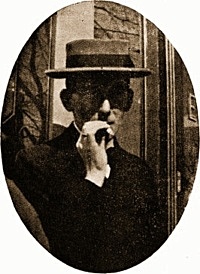
Einer Verdammten
Ha, wie sie heuchlerisch entrüstet,
Sich hüllen in die Kutten der Moral
Und wie Papa vertraulich flüstert:
»Mama, dies ist ein offener Skandal«.
Die hohe Gattin nickt verständlich
Und vor »Empörung« brennend rot
Ruft sie: »Von Denen ist es schändlich
Uns schützt vor Kindersegen doch der liebe Gott.«
Hugo Ball
(1886 – 1927)
Erstdruck in:
Der Revoluzzer (Zürich),
1. Jg., Nr. 12, Oktober 1915
fleursdumal.nl magazine
More in: Archive A-B, Ball, Hugo, Dada, DADA, Dadaïsme

Freedom
A! Fredome is a noble thing!
Fredome mays man to haiff liking;
Fredome all solace to man giffis,
He levys at ese that frely levys!
A noble hart may haiff nane ese,
Na ellys nocht that may him plese,
Gyff fredome fail; for fre liking
Is yarnyt our all othir thing.
Na he that ay has levyt fre
May nocht knaw weill the propyrte,
The angyr, na the wretchyt dome
That is couplyt to foule thyrldome.
Bot gyff he had assayit it,
Than all perquer he suld it wyt;
And suld think fredome mar to prise
Than all the gold in warld that is.
Thus contrar thingis evirmar
Discoweryngis off the tothir ar.
John Barbour
(c. 1320 -1395)
Freedom
fleursdumal.nl magazine
More in: Archive A-B, Archive A-B, CLASSIC POETRY
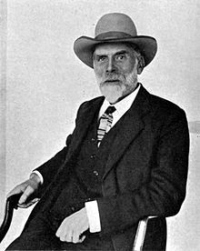
To Thos. Floyd
How fares it, friend, since I by Fate annoy’d
Left the old home in need of livelier play
For body and mind? How fare, this many a day,
The stubborn thews and ageless heart of Floyd?
If not too well with country sport employ’d,
Visit my flock, the breezy hill that they
Choose for their fold; and see, for thence you may,
From rising walls all roofless yet and void,
The lovely city, thronging tower and spire,
The mind of the wide landscape, dreaming deep,
Grey-silvery in the vale; a shrine where keep
Memorian hopes their pale celestial fire:
Like man’s immortal conscience of desire,
The spirit that watcheth in me ev’n in my sleep.
“While yet we wait for spring, and from the dry”
While yet we wait for spring, and from the dry
And blackening east that so embitters March,
Well-housed must watch grey fields and meadows parch,
And driven dust and withering snowflake fly;
Already in glimpses of the tarnish’d sky
The sun is warm and beckons to the larch,
And where the covert hazels interarch
Their tassell’d twigs, fair beds of primrose lie.
Beneath the crisp and wintry carpet hid
A million buds but stay their blossoming;
And trustful birds have built their nests amid
The shuddering boughs, and only wait to sing
Till one soft shower from the south shall bid,
And hither tempt the pilgrim steps of spring.
“In autumn moonlight, when the white air wan”
In autumn moonlight, when the white air wan
Is fragrant in the wake of summer hence,
‘Tis sweet to sit entranced, and muse thereon
In melancholy and godlike indolence:
When the proud spirit, lull’d by mortal prime
To fond pretence of immortality,
Vieweth all moments from the birth of time,
All things whate’er have been or yet shall be.
And like the garden, where the year is spent,
The ruin of old life is full of yearning,
Mingling poetic rapture of lament
With flowers and sunshine of spring’s sure returning;
Only in visions of the white air wan
By godlike fancy seized and dwelt upon.
Robert Bridges
(1844-1930)
To Thos. Floyd
fleursdumal.nl magazine
More in: *War Poetry Archive, Archive A-B, Bridges, Robert
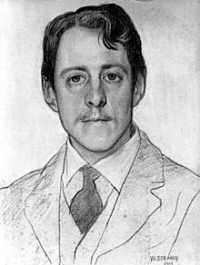
Ypres
She was a city of patience; of proud name,
Dimmed by neglecting Time; of beauty and loss;
Of acquiescence in the creeping moss.
But on a sudden fierce destruction came
Tigerishly pouncing: thunderbolt and flame
Showered on her streets, to shatter them and toss
Her ancient towers to ashes. Riven across,
She rose, dead, into never-dying fame.
White against heavens of storm, a ghost, she is known
To the world’s ends. The myriads of the brave
Sleep round her. Desolately glorified,
She, moon-like, draws her own far-moving tide
Of sorrow and memory; toward her, each alone,
Glide the dark dreams that seek an English grave.
Laurence Binyon
(1869 – 1943)
Ypres
fleursdumal.nl magazine
More in: *War Poetry Archive, Archive A-B, WAR & PEACE
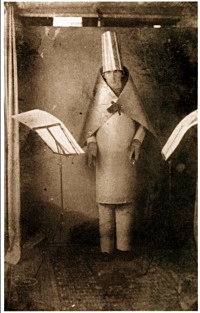
O Marietta-Kripistika!
O Marietta-Kripistika!
Thronkanapee im Serail von Sevilla!
Du bist wertvoller als die juchzende
Säubande von Hosenträgern,
Deren Rüssel
An deinem Bauch
Zu schnuppern
Gewohnt sein pflegt.
Hugo Ball
(1886-1927)
O Marietta-Kripistika!
fleursdumal.nl magazine
More in: Archive A-B, Ball, Hugo, Dada, DADA, Dadaïsme
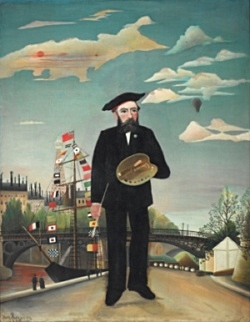
Apollinaire
Le douanier Rousseau
Tu te souviens, Rousseau, du paysage astèque,
Des forêts où poussaient la mangue et l’ananas,
Des singes répandant tout le sang des pastèques
Et du blond empereur qu’on fusilla là-bas.
Les tableaux que tu peins, tu les vis au Mexique,
Un soleil rouge ornait le front des bananiers,
Et valeureux soldat, tu troquas ta tunique,
Contre le dolman bleu des braves douaniers.
Le malheur s’acharna sur ta progéniture
Tu perdis tes enfants et tes femmes aussi
Et te remarias avecque la peinture
Pour faire tes tableaux, enfants de ton esprit.
Nous sommes réunis pour célébrer ta gloire,
Ces vins qu’en ton honneur nous verse Picasso,
Buvons-les donc, puisque c’est l’heure de les boire
En criant tous en chœur : « Vive ! vive Rousseau ! »
O peintre glorieux de l’alme République
Ton nom est le drapeau des fiers Indépendants
Et dans le marbre blanc, issu du Pentélique,
On sculptera ta face, orgueil de notre temps.
Or sus ! que l’on se lève et qu’on choque les verres
Et que renaisse ici la française gaîté ;
Arrière noirs soucis, fuyez ô fronts sévères,
Je bois à mon Rousseau, je bois à sa santé !
Guillaume Apollinaire
(1880 – 1918)
Le douanier Rousseau
fleursdumal.nl magazine
More in: Apollinaire, Guillaume, Archive A-B, FDM in Paris, Guillaume Apollinaire

Klaus Schmidt’s discovery
His lifetime work discovered him in the dust of Turkey,
the lifeline linked his work from now on until his end.
The wedding night of civilisation is his quoted words.
Carvings muted utter silences and revealed themselves.
Why waste time with this profit unto the wasted land
creeping overall the flickering darkness inhabiting us?
Man’s noises removed, the sand drenched and camouflaged
taking away in its grains the self-importance of all before.
But in the over awing wonders of politics and time’s line
the superstitious crept in niggling fear of what was not know
and gazed at him wrought in stone in the super-natural;
before the ox pulled wood to cut and plough,
before deserts, before we ourselves knew nothing still.
Numbers and letters farmed us as well
and now we have grown tall and proud in ourselves.
The sand spewed over the circles of carvings and settled.
We seek crumbs of proof if proof is needed of ourselves.
20.04.08
Vincent Berquez
Vincent Berquez is a London–based artist and poet
fleursdumal.nl magazine
More in: Archive A-B, Berquez, Vincent, Vincent Berquez
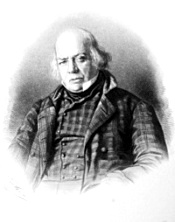
Pierre-Jean de Béranger
Les souvenirs du peuple
On parlera de sa gloire
Sous le chaume bien longtemps.
L’humble toit, dans cinquante ans,
Ne connaîtra plus d’autre histoire.
Là viendront les villageois
Dire alors à quelque vieille
Par des récits d’autrefois,
Mère, abrégez notre veille.
Bien, dit-on, qu’il nous ait nui,
Le peuple encor le révère,
Oui, le révère.
Parlez-nous de lui, grand-mère ;
Parlez-nous de lui. (bis)
Mes enfants, dans ce village,
Suivi de rois, il passa.
Voilà bien longtemps de ça ;
Je venais d’entrer en ménage.
À pied grimpant le coteau
Où pour voir je m’étais mise,
Il avait petit chapeau
Avec redingote grise.
Près de lui je me troublais,
Il me dit :
Bonjour, ma chère,
Bonjour, ma chère.
– Il vous a parlé, grand-mère !
Il vous a parlé !
L’an d’après, moi, pauvre femme,
À Paris étant un jour,
Je le vis avec sa cour
Il se rendait à Notre-Dame.
Tous les coeurs étaient contents ;
On admirait son cortège.
Chacun disait : Quel beau temps !
Le ciel toujours le protège.
Son sourire était bien doux ;
D’un fils Dieu le rendait père,
Le rendait père.
– Quel beau jour pour vous, grand-mère !
Quel beau jour pour vous !
Mais, quand la pauvre Champagne
Fut en proie aux étrangers,
Lui, bravant tous les dangers,
Semblait seul tenir la campagne.
Un soir, tout comme aujourd’hui,
J’entends frapper à la porte ;
J’ouvre, bon Dieu ! c’était lui
Suivi d’une faible escorte.
Il s’assoit où me voilà,
S’écriant : Oh ! quelle guerre !
Oh ! quelle guerre !
– Il s’est assis là, grand-mère !
Il s’est assis là !
J’ai faim, dit-il ; et bien vite
Je sers piquette et pain bis
Puis il sèche ses habits,
Même à dormir le feu l’invite.
Au réveil, voyant mes pleurs,
Il me dit : Bonne espérance !
Je cours de tous ses malheurs
Sous Paris venger la France.
Il part ; et comme un trésor
J’ai depuis gardé son verre,
Gardé son verre.
– Vous l’avez encor, grand-mère !
Vous l’avez encor !
Le voici. Mais à sa perte
Le héros fut entraîné.
Lui, qu’un pape a couronné,
Est mort dans une île déserte.
Longtemps aucun ne l’a cru ;
On disait : Il va paraître.
Par mer il est accouru ;
L’étranger va voir son maître.
Quand d’erreur on nous tira,
Ma douleur fut bien amère !
Fut bien amère !
– Dieu vous bénira, grand-mère ;
Dieu vous bénira. (bis)
Pierre-Jean de Béranger (1780-1857)
Les souvenirs du peuple
Toutes les chansons de Béranger (1843)
fleursdumal.nl magazine
More in: Archive A-B, Béranger, Pierre-Jean de
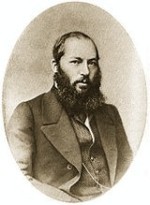
Fet
De sterren
Haast sprakeloos stond ik te kijken,
Wel duizenden sterren zag ik, –
Ik had met die duizenden sterren
Een soort van verbinding, een klik.
Ik dacht… geen idee wat ik dacht toen,
Er klonk geheimzinnig gezang,
De sterren, zij twinkelden zachtjes,
De sterren waar ik naar verlang…
Afanasi Fet, Я долго стоял неподвижно,1843.
Vertaling Paul Bezembinder 2017.
Op dit gedicht bestaat een bekende, aan Ivan Toergenjev toegeschreven parodie; deze werd aangetroffen in zijn nagelaten archieven in Parijs.

Toergenjev
…
Haast sprakeloos stond ik te kijken,
Ik dacht haast dat ik er in bleef, –
Het waren maar vreemde gedichten,
Die verzen die Fet voor ons schreef.
Ik las… geen idee wat ik las toen,
Iets met geheimzinnig behang,
Het bundeltje viel uit mijn handen,
Het ligt hier nog steeds in de gang…
Ivan Toergenjev, Я долго стоял неподвижно, 1863?
Een parodie op een gelijknamig gedicht van Afanasi Fet.
Vertaling Paul Bezembinder, 2017
Afanasi Fet & Ivan Toergenjev: De sterren (vertaling van Paul Bezembinder)
Afanasi Afanasjevitsj Fet (Russisch: Афанасий Афанасьевич Фет, 1820 – 1892)
Ivan Sergejevitsj Toergenjev (Russisch: Ива́н Серге́евич Турге́нев, 1818 – 1883)
Paul Bezembinder studeerde theoretische natuurkunde in Nijmegen. In zijn poëzie zoekt hij in vooral klassieke versvormen en thema’s naar de balans tussen serieuze poëzie, pastiche en smartlap. Zijn gedichten (Nederlands) en vertalingen (Russisch-Nederlands) verschenen in verschillende (online) literaire tijdschriften. Voorbeelden van zijn werk zijn te vinden op zijn website, www.paulbezembinder.nl
fleursdumal.nl magazine
More in: Archive A-B, Archive E-F, Archive S-T, Bezembinder, Paul, Fet, Fet, Afanasi, Toergenjev, Toergenjev, Ivan

Lammersneeuw
Waarom moet hij die de slagorde van leugens
durft te tarten uw woede velen? Behoorlijk
grof van korrel is uw gevoel voor realiteit,
mijnheer. Ik stel slechts in vraag en misdoe
niets. Wist u dat in Schotland sneeuw in april
lambing snow wordt genoemd? Te wedden
durf ik van niet. Zie je nou wel? Zinnig slot.
Bert Bevers
Bert Bevers is a poet and writer who lives and works in Antwerp (Be)
fleursdumal.nl magazine
More in: Archive A-B, Archive A-B, Bevers, Bert

brulba dori
brulba dori daula dalla
sula lori wauga malla
lori damma fusmalu
Dasche mame came rilla
schursche saga moll vasvilla
suri pauge fuzmalu
Dolli gamba bokamufti
sabel ize spogagufti
palazuma polja gei
mula dampe dori villa
alles virds schavi drestilla
offi lima dozapau
pozadau
Hugo Ball
(1886-1927)
gedicht: brulba dori
fleursdumal.nl magazine
More in: Archive A-B, Ball, Hugo, Dada, DADA, Dadaïsme
Thank you for reading Fleurs du Mal - magazine for art & literature